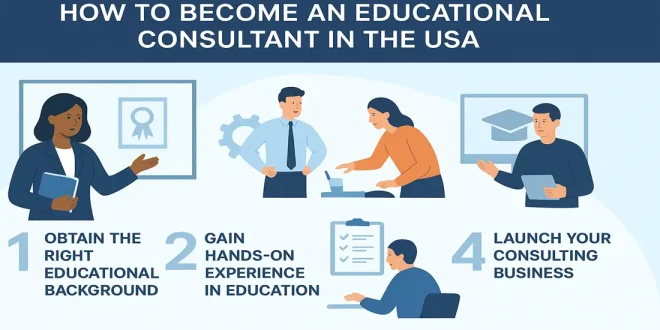As the educational environment continues to change in the USA, schools, parents, and associations are increasingly turning to educational consultants to enhance student achievement, develop curricula cohesively, and navigate college admissions processes. To become an educational consultant is to combine one’s academic knowledge, professional encounters, networking and communication skills in a constructive manner, all of which takes considerable effort. In this guide, I will help you make the journey to educational consultancy in the USA as seamless as possible.
What is an Educational Consultant?
An educational consultant is an expert who provides professional guidance to students, parents, schools, and educational bodies. Some common areas of specialization are:
College admissions consulting
Curriculum development and evaluation
Learning disabilities, special education services and advocacy
School administration
Homeschooling
Career counseling and academic advising
A number of educational consultants operate as sole practitioners, creating a dependable clientele attuned to their knowledge and perspectives on the US educational system. Some educational consultants work with consulting firms, public educational systems or schools.
Step 1: Obtain the Right Educational Background
The beginning phase of this professional journey consists of acquiring the appropriate education. The bare minimum educational qualification as an aspiring educational consultant is a bachelor’s degree in education, counseling, psychology, or related fields.
Nonetheless, higher degree qualifications, especially master’s degree or doctorate must be obtained to be in a position to gain respect in the field. This higher degree must be in one of the following:
– Master’s in Education (M.Ed.)
Master’s in School Counseling or Psychology
Doctor of Education (Ed.D.)
– Ph.D. in Education Policy or Curriculum Design
These qualifications assist in acquiring a stronger position as well as assist in narrowing the focus in one or two areas of expertise. This further assists in developing a specialization that one can work in.
Step 2: Gain Hands-On Experience in Education
This phase consists of acquiring the appropriate work experience. Educational consultants who possess actual work experience in the education system, including the workings of the classroom as well as the administrative side, are considered extremely valuable. This experience is critical as it equips the educational consultant with the required knowledge to solve operational challenges.
Some of the most appropriate experience to gain includes:
– Working as a K-12 or higher education teacher
– School counseling, curriculum specialization, or academic advising
– Educational administration and school leadership
– Educational policy development or curriculum design
Real life experiences will help build your perspective in consulting as well as build your credibility and knowledge in the field.
Step 3: Pick a Consulting Specialty
Since the education sector is large, in order to attract the right clients, effective consultants tend to concentrate on one niche. Specialization allows you to position yourself as a well focused and proficient expert while tailoring your services to your targeted market.
Common Areas of Focus in Teaching Consulting
Assisting students in admissions prep, essay writing, and interview coaching.
Collaborating with schools and families on the formulation of Individualized Education Programs (IEPs).
Creating professional development training for teachers and designing instructional materials.
Helping international students adapt to the US education system.
Creating and implementing digital pedagogy and e-learning frameworks for schools.
Facilitating targeted career and academic planning for students.
Establishing your differentiation for a domain will assist you in refining your value proposition and enable you to raise your rate.
Step 4: Cultivating Analytical and Communication Proficiencies
An educational consultant has to evaluate each situation and educational challenge, devise a corresponding solution, and articulate a detailed and actionable report. The following skills need to be established:
Research and analysis – assessing the educational programs and the corresponding results requires developing appropriate skills in analysis and educational research.
Oral and written communication – for the exchange of ideas and for consultations.
Holistic and analytical skills – identifying the issues.
Relationship and diplomacy – establishing relationships with schools and parents, and educational institutions.
Attending workshops, leadership programs, and other self-directed professional development activities will enhance these vital skills.
Step 5: Professional Accreditation and Certification
Professional accreditation is not a must, but it undoubtedly increases confidence and educational consultant marketability. There are several well-known professional discernment bodies in the United States that provide accreditation.
Popular Certificates:
Certified Educational Planner (CEP).Granted by the American Institute of Certified Educational Planners (AICEP).
Independent Educational Consultants Association (IECA) Membership. This is a widely recognized credential for independent consultants.
National Board Certification (NBPTS) – best suited with previous educators becoming consultants.
These kinds of credentials show your commitment to the best practice and will help you when you are trying to get clients and contracts.
Step 6: Build Your Professional Network
When it comes to launching and growing a consulting practice, there is no greater asset than a network of contacts. Building relationships with educators, school administrators, counselors, and others within the business may help you obtain referrals and prospective business partners.
Active Networking:
– Go to education-related conferences, workshops, and seminars.
– Become a member of a professional association, such as IECA, NACAC, or ASCD.
– Join education consulting webinars and discussion forums.
– Contact school systems, private education establishments, and educational nonprofit organizations.
Well-developed relationships can lead to significant consulting assignments and a continuous stream of clients for your practice.
Conclusion: Building a Rewarding Career as an Educational Consultant in the USA
In the USA, being an educational consultant is a much gratifying profession. You can positively influence students, families, and an entire educational system. You can become a leader in this profession if you follow a pathway. Start with the appropriate education, gain some experience, focus, and niche, and develop a professional network. You can create a powerful consulting practice that can change the educational landscape with some client work, professional development, and your consulting practice.

